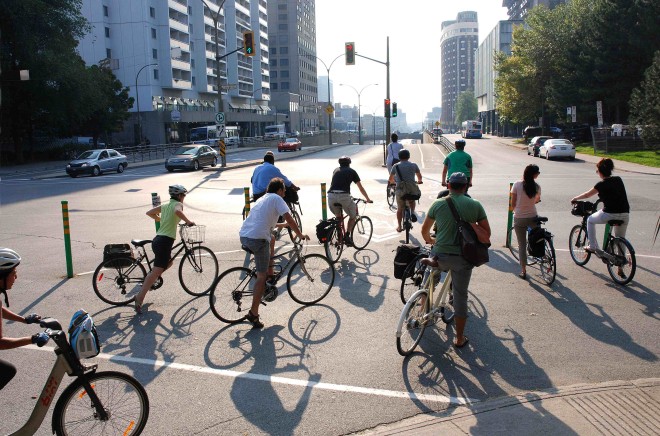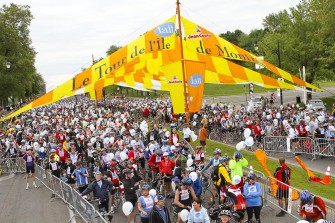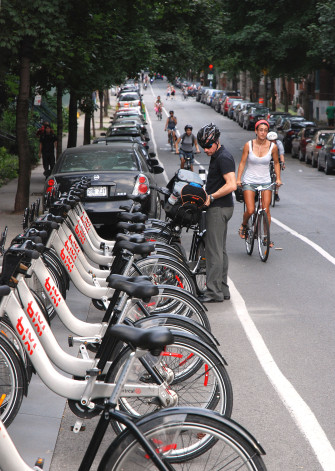
Quebec: Car Crazy or Cycling Mad?

'Québécois' Cycling Guru, Jean-Francois Pronovost Credit: Guy Maguire
With Velo-city Global coming to Vancouver (Canada), we shouldn’t forget that Quebec is a North American leader when it comes to cycling. Some neighbourhoods in Montreal have 7% of all trips by bicycle. Jean-Francois Pronovost from Vélo Québec tells us about the cycling situation in Quebec.
It’s been said before that Quebecers are Car Crazy. The Montreal Gazette once proclaimed that “Quebecers love their cars”. Scratch a little deeper and you’ll soon find that they’re also in love with their bicycles. Between 1987 and 2010, the total number of bicycles in Quebec more than doubled and the number of regular cyclists increased by 50%.
Much of the story of Quebec’s cycling renaissance lies in the advocacy organization Vélo Québec, now going on 45 years old. Based in Montreal, it’s devoted to the promotion of the bicycle.
“When it first began, the purpose was mainly recreational. Yet year after year, the transportation component became more and more important,” says Pronovost.
There’s little doubt that the organization has evolved incredibly. According to Pronovost, it’s now reached a turning point, with 100 employees working for the group. Much of the organizations’ growth is owed to the “Tour de l’Île”, an annual event which sees the Island of Montreal closed off to traffic and around 30,000 people getting on bikes. Pronovost smiles when he recalls that “one year we had to turn back 15,000 people because we didn’t have enough places.”
The event was a game changer, shifting the attitudes towards cycling in place where car was previously king.
Transport Politics Canadian Style.
“The first thing you have to understand in Canada is that land transportation is a provincial jurisdiction,” explains Pronovost.
“It’s up to the ministry of transport in each province to provide better access to roads and build roads.”
Part of this provincial policy would explain the disparate figures in cycling policy in Canada. Montreal has one of the highest cycling modal shares in Canada, with cyclists accounting for 2% of all trips, and up to 7% in certain neighbourhoods. Other cities, such as Toronto, infamous for its car loving Mayor Rob Ford, have fewer cyclists. Montreal’s stella performance is partly due to the synergy between the bicycle movement and the authorities, with the area having a provincial bicycle policy since 1995.
A video of Toronto Mayor, Rob Ford on cyclists
Pronovost definitely wanted to set one thing straight however. Being cycling mad is not just a European tradition. In late march this year, with some unusually hot weather pushing up to 26 degrees, the Vélo Québec offices had more than 5,000 cyclists passing by their offices every day.
I was also curious to learn whether or not cold weather complicated things.
“You’d be surprised to hear that we’re seeing more and more people cycling winter,” replies Pronovost.
Nevertheless, there’s no denying when temperatures drop to -25, one has to be brave to take to the streets on two wheels. Even he admits that’s he’s not game to tackle such extreme temperatures. But he explains that he usually cycles easily until mid-December and then begins again in March, meaning there is almost 10 months where cycling is possible.
“There’s skepticism when we talk about cycling in North America. There’s a long tradition on cycling and walking. And it’s amazing to see in some cities in North America that the movement is growing.”
But surely, cycling will never reach levels seen in Europe? Distances are simply too large for everyday people.
“That’s simply not true,” refutes Pronovost. “Even in Quebec, most people live in the cities of Ottawa, Montreal or Quebec City. And if cities start marrying cycling with public transport, the potential is enormous.
Bike Share Schemes
When Bixi bike sharing first came to Montreal, many Quebecers remained skeptical. Pronovost was one of them. Now after nearly 3 years in operation, his attitude has changed completely. 11 months after the scheme opened there were an estimated half a million trips. When the scheme reopens for the summer months, it’s expected to have 411 stations, with 5,120 docking and locking points.
But the real winner according to Pronovost is the cultural change that such a scheme has brought about.
“It really raised the status of cycling to another level. With BIXI you began to see downtown business people and ordinary people move around the city by bicycle. It gave cyclists such a big boost in terms of visibility, and it’s really pushed the city to provide more infrastructure.”
Vancouver will also be launching a bike-share scheme at the time of the Velo-city conference, however it remains to be seen how they will tackle compulsory helmet laws.
But without a doubt, since introducing bike share shemes, Montreal has made big changes in infrastructure. It generally has on street bicycle paths however it recently has been getting more and more segregated infrastructure.
“For the past 3-4 years, there’s also been more Contra-flow bicycle lanes especially in down town areas. Give more access to city down town. We have there a really dedicated a big freeway from east to west in the business district. We have also to integrate cyclists in cyclists into reserve lanes.”
When quizzed on the “magic formula” to get more people cycling, Pronovost tells me that’s it isn’t quite that simple.
“Again, in the society where the car is so important, many people won’t cycle if they don’t have the proper infrastructure. But it takes a cocktail of measure to get more people on bicycles. You need to build better infrastructure and combine that with other measures such as reducing speeds in neighbourhoods, improving bike/transit connection etc.”
Velo-city Global: Can Europeans learn from Canada about cycling?
The Velo-city Global conference is based in Vancouver this year. So undoubtedly, the question arises, what can Europeans learn from Vancouver in terms of cycling policy?
Well believe it or not, Canada actually saw the first global gathering of cycling experts in September 1992 at “Vélo Mondiale Pro Bike” conference. The experts were reportedly considered ‘crazy’ at the time, but times have changed. The Velo-city Global conference is now taken seriously, attracting 1000 experts from across the globe. And governments are begging for their advice.
Pronovost believes that cities will get an exclusive look at how Vancouver is tackling problems related to urban density:
“Vancouver is a very interesting size when it comes to North American Cities. For the past 10-15 years they’ve been trying to densify the city, and the way they plan for transportation. And the bicycle is now becoming a key ingredient”
Reflecting on past travels to Europe, he noted that many Europeans countries are struggling with similar issues:
“In a recent visit in France, I still saw the old villages and town centres but there’s no denying that you have ugly suburbs popping up. Urban Sprawl was happening there. We have to fight against this. We have to change our approach to urban planning.”
Pronovost believes that the conference will give planners a unique opportunity to see how the bicycle can help make cities more livable, and see how Vancouver is changing its approach to transport and urban planning.
And there’s no denying that it’s going to be a mutual exchange of information. While cycling havens of the Netherlands and Denmark are doing well, there are just as many that need a boost. The UK, France, Spain and Italy –more than a third of the EU’s population- see less than 5% of people using their bicycles as their main mode of transport.
There’s little doubt that Velo-city Global will have something on offer for everybody.
 About the Author
About the Author
Julian Ferguson is the Communications Officer for the European Cyclists’ Federation. Originally hailing from Australia and a keen bicycle advocate, he plans one day to ride his bicycle from Brussels to Melbourne
Why the interest in North America?
ECF is not just interested in cycling in Europe. We think it’s important to take a global perspective. So much so that our next big conference, Velo-city Global 2012, is taking place in Vancouver on the 26-29th of June. It’s the biggest cycling planning conference in the world, bringing together the best and the brightest in cycling and transport policy. Check out the conference website here, and register now. It’s going to be a great event.
Contact the author
Recent news!
Upcoming events
Contact Us
Avenue des Arts, 7-8
Postal address: Rue de la Charité, 22
1210 Brussels, Belgium














